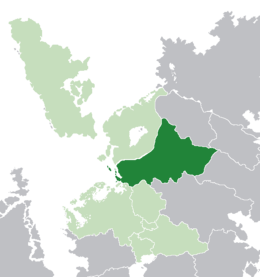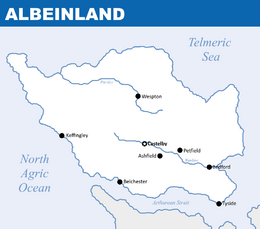Albeinland: Difference between revisions
No edit summary |
No edit summary |
||
| Line 76: | Line 76: | ||
'''Albeinland''', officially the '''Kingdom of Albeinland''' but also known as '''Alba''' or '''Albion''', is a sovereign state in west [[Lorecia]], bordering [[Noordenstaat]] and [[Fyngaria]] to the south, Arstotska and [[Aswick]] to the northeast and the [[Aurora Confederacy]] to the northwest. The geographical location of Albeinland corresponds to the western part of the continent of Lorecia known as the Alban Plateaus besides owning three islands in the {{wp|English Channel|Albish Channel}}. The country have a population of approximately 30 million inhabitants according to its latest census, with the largest portion of the population living in the capital and largest city, Castelby. Albeinland has been a member state of the World Assembly since 1999 and was one of the founding states of the [[Lorecian Community]] in 1994. | '''Albeinland''', officially the '''Kingdom of Albeinland''' but also known as '''Alba''' or '''Albion''', is a sovereign state in west [[Lorecia]], bordering [[Noordenstaat]] and [[Fyngaria]] to the south, Arstotska and [[Aswick]] to the northeast and the [[Aurora Confederacy]] to the northwest. The geographical location of Albeinland corresponds to the western part of the continent of Lorecia known as the Alban Plateaus besides owning three islands in the {{wp|English Channel|Albish Channel}}. The country have a population of approximately 30 million inhabitants according to its latest census, with the largest portion of the population living in the capital and largest city, Castelby. Albeinland has been a member state of the World Assembly since 1999 and was one of the founding states of the [[Lorecian Community]] in 1994. | ||
Albeinland has its origins in the beginning of the settlement of several Arlethian tribes in the modern-day Albish territory in the early 1st century BCE. With the growth of these tribes and the increase of foreign influence by several countries, the tribes began to evolve with the founding of the first Albish kingdoms and cities taking place in the 6th century, being the Kingdoms of Anglea and Cambria and the Duchy of Lencester one of the most | Albeinland has its origins in the beginning of the settlement of several Arlethian tribes in the modern-day Albish territory in the early 1st century BCE. With the growth of these tribes and the increase of foreign influence by several countries, the tribes began to evolve with the founding of the first Albish kingdoms and cities taking place in the 6th century, being the Kingdoms of Anglea and Cambria and the Duchy of Lencester one of the most influential in the region. In the 11th century, after several wars and conflicts, the House of Annesley of Anglea managed to unify all the region and thus establishing the Kingdom of Albeinland. The {{wp|Middle Ages}} were a scene for military conquests which helped to solidify the territory of the Albish state in Lorecia. | ||
The country converted to {{wp|Protestantism}} during the {{wp|Reformation}}, but, despite the establishment of the Church of Albeinland (also known as Albyanism), the absolutist monarchs and the parliament continued to confront one another, leading to the Oxford Revolution (also called as the Albish Civil War) between 1661 and 1663, with the constitutionalists overcoming the absolutists and introducing a {{wp|Constitutional monarchy|constitutional monarchy}} into Albeinland. The 18th century was a golden age for Albeinland's politics, economics and philosophy, maintaining its position as a wealthy nation in Lorecia despite political instabilities at the end of the century due a growing radicalism inside society. The 19th century witnessed the establishment of modern democracy in the country, with {{wp|Universal manhood suffrage|universal male suffrage}} being enacted in 1872 and the {{wp|Women's suffrage|vote for women}} in 1919. | The country converted to {{wp|Protestantism}} during the {{wp|Reformation}}, but, despite the establishment of the Church of Albeinland (also known as Albyanism), the absolutist monarchs and the parliament continued to confront one another, leading to the Oxford Revolution (also called as the Albish Civil War) between 1661 and 1663, with the constitutionalists overcoming the absolutists and introducing a {{wp|Constitutional monarchy|constitutional monarchy}} into Albeinland. The 18th century was a golden age for Albeinland's politics, economics and philosophy, maintaining its position as a wealthy nation in Lorecia despite political instabilities at the end of the century due a growing radicalism inside society. The 19th century witnessed the establishment of modern democracy in the country, with {{wp|Universal manhood suffrage|universal male suffrage}} being enacted in 1872 and the {{wp|Women's suffrage|vote for women}} in 1919. | ||
Revision as of 17:54, 12 March 2019
Kingdom of Albeinland | |
|---|---|
| Motto: Libertas quæ sera tamen "Liberty albeit late" | |
| Anthem: Albish National Anthem | |
 Albeinland (dark green) in Lorecian Community (light green) | |
 Political map of Albeinland | |
| Capital and largest city | Castelby |
| Official languages | English |
| Ethnic groups (2018) |
|
| Demonym(s) |
|
| Government | Unitary parliamentary constitutional monarchy |
• Monarch | Catherine II |
• Chancellor | Vincent Lloyd |
| Legislature | Parliament |
| House of Commons | |
| House of Lords | |
| Establishment | |
• Foundation of Castelby | 5th century AD |
• Unification | 12 December 1016 |
• Oxford Revolution | 16 August 1652 |
| Area | |
• Total | 1,291,800 km2 (498,800 sq mi) |
| Population | |
• 2019 estimate | 30,969,622 |
• 2018 census | 30,968,221 |
• Density | 23/km2 (59.6/sq mi) |
| GDP (PPP) | 2018 estimate |
• Total | £4.028 trillion |
• Per capita | £29,072 |
| GDP (nominal) | 2018 estimate |
• Total | £5.109 trillion |
• Per capita | £34,011 |
| Gini (2018) | low |
| HDI (2018) | very high |
| Currency | Sterling (£) |
| Time zone | UTC+1 (UTC) |
| Date format | dd-mm-yyyy |
| Driving side | left |
| Calling code | +36 |
Albeinland, officially the Kingdom of Albeinland but also known as Alba or Albion, is a sovereign state in west Lorecia, bordering Noordenstaat and Fyngaria to the south, Arstotska and Aswick to the northeast and the Aurora Confederacy to the northwest. The geographical location of Albeinland corresponds to the western part of the continent of Lorecia known as the Alban Plateaus besides owning three islands in the Albish Channel. The country have a population of approximately 30 million inhabitants according to its latest census, with the largest portion of the population living in the capital and largest city, Castelby. Albeinland has been a member state of the World Assembly since 1999 and was one of the founding states of the Lorecian Community in 1994.
Albeinland has its origins in the beginning of the settlement of several Arlethian tribes in the modern-day Albish territory in the early 1st century BCE. With the growth of these tribes and the increase of foreign influence by several countries, the tribes began to evolve with the founding of the first Albish kingdoms and cities taking place in the 6th century, being the Kingdoms of Anglea and Cambria and the Duchy of Lencester one of the most influential in the region. In the 11th century, after several wars and conflicts, the House of Annesley of Anglea managed to unify all the region and thus establishing the Kingdom of Albeinland. The Middle Ages were a scene for military conquests which helped to solidify the territory of the Albish state in Lorecia.
The country converted to Protestantism during the Reformation, but, despite the establishment of the Church of Albeinland (also known as Albyanism), the absolutist monarchs and the parliament continued to confront one another, leading to the Oxford Revolution (also called as the Albish Civil War) between 1661 and 1663, with the constitutionalists overcoming the absolutists and introducing a constitutional monarchy into Albeinland. The 18th century was a golden age for Albeinland's politics, economics and philosophy, maintaining its position as a wealthy nation in Lorecia despite political instabilities at the end of the century due a growing radicalism inside society. The 19th century witnessed the establishment of modern democracy in the country, with universal male suffrage being enacted in 1872 and the vote for women in 1919.
Politically, Albeinland is a democratic constitutional parliamentary monarchy, with the Chancellor acting as the head of government. The national legislature is the Parliament, which is divided into two chambers: the House of Commons and the House of Lords. The House of Commons is elected by popular vote, being the lower house of parliament while the House of Lords is a upper house appointed by the sovereign with the consent of the Chancellor, the Leader of the Opposition and also by the Privy Council of Her Majesty. The country have a semi-written constitution based on the Common Law enacted in 1665, but also uses charters and conventions in its legal system. The Kingdom is divided between seven provinces, each being governed by a Royal Commissioner appointed by the sovereign also under the consent of the Chancellor and the Privy Council. The provinces are: Anglea, Cambria, Lencester, Bedfordshire, Greater Castelby, Zuidland and Saint Laurent.


